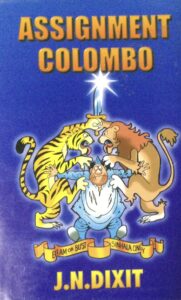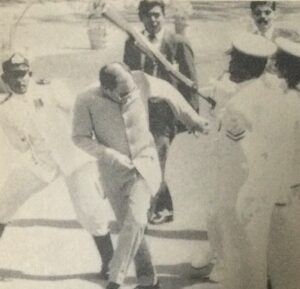Rebutting the Biased View of Journalist Jeyaraj
by Sachi Sri Kantha, August 7, 2022
Recently, a review by D.B.S. Jeyaraj on the Indo-Sri Lanka Accord (appropriately tagged as the Rajiv – Jayewardane Accord) was published in the Daily Mirror (Colombo) on July 30, 2022, under the caption ‘Indo-Lanka Accord 35th Anniversary: How the Tamils Messed up a Golden Opportunity’. While reading this opinion, I noted two facts. These were,
(1) Towards the end, Jeyaraj opined, “On the other hand there was the colossal political stupidity and self-centred arrogance of the LTTE. Not only did it target the Sri Lankan armed forces but also took on the Indian soldiers. New Delhi had no choice other than to fight the Tigers. The IPKF-LTTE war altered the flow of events.” When it comes to writing about the LTTE, one should mark the words Jeyaraj uses – ‘colossal political stupidity and self-centred arrogance’. Well, he has to earn his brownie points from a Sinhalese paymaster. Let’s leave it at that level. Jeyaraj’s propagated version is that of the ‘House of Hindu’ version or the ‘RAW truth’ version. Acronym RAW standing for India’s gumshoe or spy agency, the Research & Analysis Wing. This version has more holes than in a block of Swiss cheese.
 (2) No mention is made by Jeyaraj about Jyothindra Nath (J.N.) Dixit (1936-2005), the then India’s high commissioner to Sri Lanka, who carried the unofficial tag as ‘chief fixer’ of the 1987 Accord. For posterity in his memoir of the time, Dixit presented us with the nitty-gritty details of the personalities involved in this failed 1987 Accord, and to his credit, in the final chapter had provided the reasons, why India failed. To counter Jeyaraj’s erroneous twisting of facts, first I wish to highlight nine factors that Dixit had recorded in hindsight, in his 1998 book, ‘Assignment Colombo’.
(2) No mention is made by Jeyaraj about Jyothindra Nath (J.N.) Dixit (1936-2005), the then India’s high commissioner to Sri Lanka, who carried the unofficial tag as ‘chief fixer’ of the 1987 Accord. For posterity in his memoir of the time, Dixit presented us with the nitty-gritty details of the personalities involved in this failed 1987 Accord, and to his credit, in the final chapter had provided the reasons, why India failed. To counter Jeyaraj’s erroneous twisting of facts, first I wish to highlight nine factors that Dixit had recorded in hindsight, in his 1998 book, ‘Assignment Colombo’.
Factor 1: “The theory that Rajiv Gandhi insisted on the agreement despite advice against it is wrong. Intelligence agencies, armed forces and the Ministry of External Affairs, including myself told him that the initiatives being taken for signing the agreement were valid and practical. My advice to him was that it was time to bypass the LTTE if they remain obstinate, garner support from other Tamil groups and sign the agreement directly with the Jayewardene Government….the then Chief of the Army staff, General K. Sundarji told Rajiv: ‘This should not be a matter of concern. The Indian armed forces can neutralize the LTTE in a fortnight or three to four weeks.’ It was on these confident assertions that Rajiv Gandhi went ahead with the agreement. He did not overrule the professional advice given to him. That the advice was wrong and the political judgement on which this advice was based was erroneous has to be acknowledged with the benefit of hindsight.”
Factor 2: “In fact, there were periods when the Indian defence establishment, the intelligence agencies and the Ministry of External Affairs were working at cross-purposes.”
Factor 3: “In fact, Rajiv Gandhi’s expectation that once M.G. Ramachandran supported the agreement (which he did) he would have full cooperation from Tamil Nadu in implementing his policies in Sri Lanka proved to be wrong.”
Factor 4: “One over-arching miscalculation of India was our under-estimating Prabhakaran’s passionate, even obsessive, commitment to the cause of Tamil Eelam, his authoritarian and single-minded nature, his tactical cleverness and his resilience in adversity. The second miscalculation about him and his cadres was that India and Sri Lanka together could persuade other Tamil groups and the Tamil population in general to join the mainstream of democratic politics bypassing the LTTE. The Governments of India and Sri Lanka partially succeeded in the second exercise. But soon the contradictions of their own policies prevented tangible success in this respect.”
Factor 5: “I overestimated the sincerity and the political will of Jayewardene to come to a genuine compromise with the Tamils with the help of the Government of India.”
Factor 6: “I was convinced that the LTTE will not participate in any negotiated compromise. I, therefore, felt that India should deal with other Tamil groups bypassing the LTTE and isolating it. My assessment at that time was that if other Tamil groups join the Indian initiative, the LTTE can be successfully isolated initially which would compel it to join the peace process. I was wrong in this assessment.”
Factor 7: “My expectation that the LTTE could be successfully isolated from Sri Lankan Tamils also proved to be wrong.”
Factor 8: “My assessment that Indian public opinion and political parties will rise above their apprehensions and interim difficulties and would be fully supportive of a comprehensively practical compromise, safeguarding Sri Lankan interests, Tamil aspirations and India’s regional security concerns. I was wrong in this anticipation.”
Factor 9: “My anticipation that once Jayewardene signs the agreement he will be decisive in neutralizing Premadasa and Lalith Athulathmudali and their policies against Tamils and the agreement, also proved to be wrong. Jayewardene either did not have the political will, or his approach was that of tactical intrigue because of which he refrained from reining in Lalith and Premadasa from their negative activities against the Indo-Sri Lankan Agreement.”
My Take

Rajiv Gandhi hit by a rifle butt in Colombo, July 30, 1987
These being the real facts, D.B.S. Jeyaraj’s revisionist attempt in writing history and faulting LTTE alone for the failure of the Indo-Lanka Accord of 1987 is contemptible for this one Eelam Tamil observer. Also to be noted, and not mentioned by either Dixit (in the above-stated factors for India’s failing) and Jeyaraj, was the fact that Sinhalese nation in its entirety (then Opposition Party, the SLFP led by Sirima Bandaranaike; the JVP led by Rohana Wijeweera and the Buddhist clergy, in addition to the influential Cabinet members in Jayewardene’s party as noted by Dixit) also opposed the 1987 Rajiv-JR Accord. Mervyn de Silva reported in the Financial Times of July 23, 1987 that six of the Cabinet ministers dissented from the Accord. Muslims were also split in their approval of the Accord. If this was the reality, then what was wrong in the LTTE also opposing the Rajiv-JR Accord? One shouldn’t forget the fact that, before his untimely death in May 1991, Rajiv might have lost his life due to the assault by the naval rating sympathetic to the JVP, who hit the then Indian leader with his rifle butt, on July 30, 1987. There was even a JVP assassination attempt on Jayewardene, inside the Sri Lankan parliament on August 18, 1987.
Dixit had paid a left handed compliment to Prabhakaran, that unlike other Tamil militant pretenders, Prabhakaran couldn’t be bought by clemency, electoral victory in politics and money.
While I have remained pro-LTTE in my writings, Jeyaraj has asserted his anti-LTTE views constantly, for over 30 years. I do accept that he is entitled to his view, and he has his fan circle. But, what I find difficult to accept is that he fancies and pretends himself as a writer of recent history, without a bias. This cannot be true. On this particular issue, the opinion of philosopher-pedagogue Bertrand Russell (1872-1970) deserves attention. In his ‘Autobiography’ Bertrand Russell had written, “To my mind, a man without a bias cannot write interesting history – if, indeed, such a man exists. I regard it as mere humbug to pretend to lack of bias. Since I do not admit that a person without bias exists, I think the best that can be done with a large scale history is to admit one’s bias and for dissatisfied readers to look for other writers to express an opposite bias. Which bias is nearer to the truth must be left to posterity.”
*****